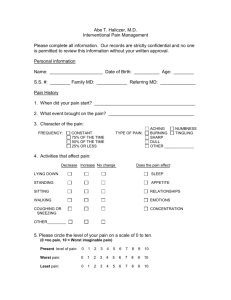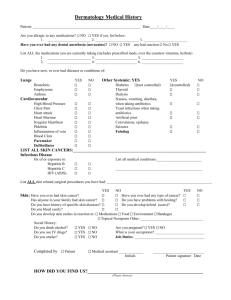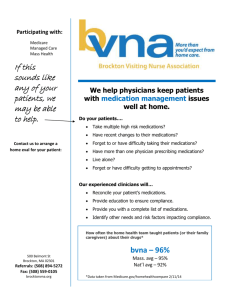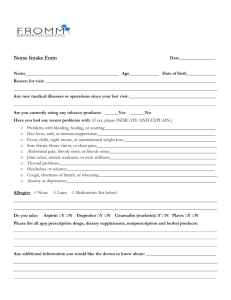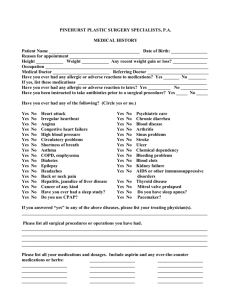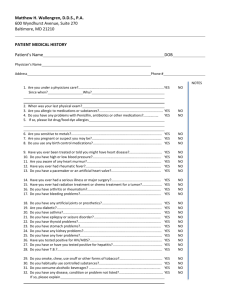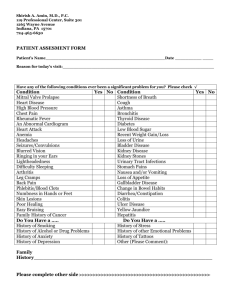Arthritis Treatment Options
advertisement
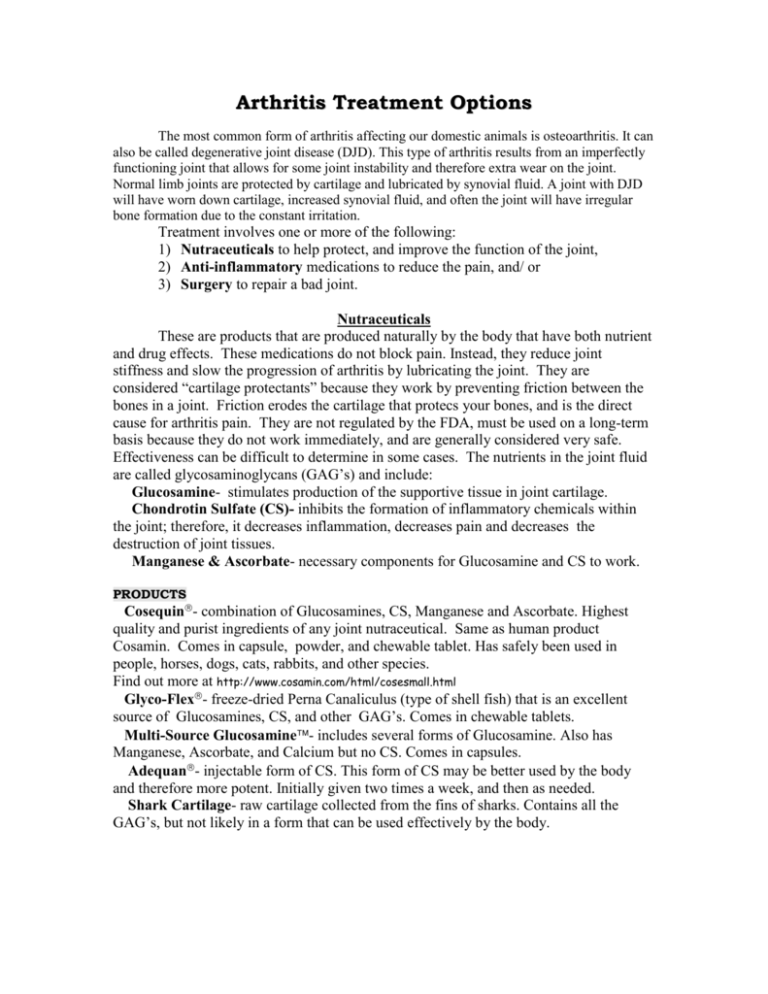
Arthritis Treatment Options The most common form of arthritis affecting our domestic animals is osteoarthritis. It can also be called degenerative joint disease (DJD). This type of arthritis results from an imperfectly functioning joint that allows for some joint instability and therefore extra wear on the joint. Normal limb joints are protected by cartilage and lubricated by synovial fluid. A joint with DJD will have worn down cartilage, increased synovial fluid, and often the joint will have irregular bone formation due to the constant irritation. Treatment involves one or more of the following: 1) Nutraceuticals to help protect, and improve the function of the joint, 2) Anti-inflammatory medications to reduce the pain, and/ or 3) Surgery to repair a bad joint. Nutraceuticals These are products that are produced naturally by the body that have both nutrient and drug effects. These medications do not block pain. Instead, they reduce joint stiffness and slow the progression of arthritis by lubricating the joint. They are considered “cartilage protectants” because they work by preventing friction between the bones in a joint. Friction erodes the cartilage that protecs your bones, and is the direct cause for arthritis pain. They are not regulated by the FDA, must be used on a long-term basis because they do not work immediately, and are generally considered very safe. Effectiveness can be difficult to determine in some cases. The nutrients in the joint fluid are called glycosaminoglycans (GAG’s) and include: Glucosamine- stimulates production of the supportive tissue in joint cartilage. Chondrotin Sulfate (CS)- inhibits the formation of inflammatory chemicals within the joint; therefore, it decreases inflammation, decreases pain and decreases the destruction of joint tissues. Manganese & Ascorbate- necessary components for Glucosamine and CS to work. PRODUCTS Cosequin- combination of Glucosamines, CS, Manganese and Ascorbate. Highest quality and purist ingredients of any joint nutraceutical. Same as human product Cosamin. Comes in capsule, powder, and chewable tablet. Has safely been used in people, horses, dogs, cats, rabbits, and other species. Find out more at http://www.cosamin.com/html/cosesmall.html Glyco-Flex- freeze-dried Perna Canaliculus (type of shell fish) that is an excellent source of Glucosamines, CS, and other GAG’s. Comes in chewable tablets. Multi-Source Glucosamine- includes several forms of Glucosamine. Also has Manganese, Ascorbate, and Calcium but no CS. Comes in capsules. Adequan- injectable form of CS. This form of CS may be better used by the body and therefore more potent. Initially given two times a week, and then as needed. Shark Cartilage- raw cartilage collected from the fins of sharks. Contains all the GAG’s, but not likely in a form that can be used effectively by the body. NOTE * Many other products containing Glucosamines, CS, and other GAG’s are available. They vary greatly in purity and source. Many of lesser quality may not be very effective, and worse, may have impurities that can be harmful. * The main purpose of the GAG’s is to decrease the progression of the arthritis and to a much lesser extent decrease pain. * Glucosamine and CS are more effective if used together. * After initial response, most products can be reduced in quantity given. * The Veterinary Approved products are recommended because of the known safety and purity of these products. * Loading dose of Glucosamines and CS are approximately 44mg/kg each. * Average onset of effect is usually 4-6 weeks * Mild side effects of intestinal gas, and soft stools are dose dependent. Monitor glucose regulation changes if used in diabetics. PAIN RELIVING MEDICATIONS ANTI-INFLAMMATORY DRUGS These are drugs regulated by the FDA. They have great potential for harmful side effects if not used properly. They should only be used as prescribed by a veterinarian. Most can be used as needed for pain or inflammation, and effectiveness can be noted within several hours. All anti-inflammatory medications work by interfering with the chemicals that trigger nerves to “feel” pain and that trigger inflammation. Unfortunately, these same chemicals also protect the linings of the stomach, intestine, and kidneys from damage, so vomiting and diarrhea are common side effects, and kidney failure is a potential rare side effect. Routine blood tests should be done to ensure your pet’s treatment is not causing any harmful side effects. Only one of these drugs should be used at a time; however, these medications can be used in conjunction with the nutraceuticals. 1. Non-Steroidal Anti-Inflammatories: Aspirin- over-the-counter medication that can be useful in reducing the inflammation associated with arthritis. Best if used in buffered form (i.e. Ascriptin or Ecotrin) and given with food. Side effects can include stomach upset and bleeding problems. Should be used with extreme care in cats. Other products are better if pain relief is needed frequently. Consult a veterinarian before using Aspirin or any other medication for proper usage and dose. Rimadyl- veterinary prescription drug. Similar to Aspirin but seems to be more potent in dogs with less stomach upset. Safe in bleeding disorders. Shouldn’t be used if underlying liver disease. Any vomiting, diarrhea, or loss of appetite please stop medications and call the office immediately. Metacam- prescription drug with once daily dosage. Also easier on stomach and more potent than Aspirin. Metacam is metabolized more through the kidneys than the liver, so it is safer to use in pets with mild liver disease, but should be avoided in pets with any kidney issues. Deramaxx 2. Steroidal Anti-Inflammatories: Corticosteroids- drugs like Prednisone and Dexamethasone have very strong antiinflammatory effects. They not only block the chemicals that trigger pain receptor nerves, but also interfere with the white blood cells that cause inflammation. They can be used to reduce the swelling, irritation, and pain associated with severe arthritis, but eventually can contribute to cartilage destruction. Often they are prescribed for acute flare ups, or for short-term relief, but side effects make it undesirable for long-term use in most cases. 3. Cell Mediated Blockers: Tramadol is a pain medication that works by interfering with the white blood cells that cause inflammation. It stops inflammation at the tissue site instead of blocking the body’s ability to ‘feel” pain. Unlike other anti-inflammatory medications, it rarely causes stomach upset, and is relatively safe to use in patient’s with other medical conditions. It can be used in conjunction with other anti-inflammatory medications and morphine based pain medications for more severe or chronic pain. 4. Pain Receptor Blockers: Morphine based products. Medications like Torbugesic, Hycodan, Codeine and Fentanyl can be used separately or with anti-inflammatories to help treat acute severe pain, or chronic debilitating pain. Common side effects include sedation, constipation, and nausea. The liver and kidneys tolerate these medications well, but they should be used with caution in patients with heart or respiratory disease. NEVER USE IBUPROFEN (Advil, Motrin, etc.) in dogs or in cats. NEVER USE ACETAMINOPHEN (Tylenol) in cats. NEVER use any drugs not previously okayed by a veterinarian! All long term use of pain medications has the potential to disrupt liver or kidney function, so routine blood tests are recommended twice yearly if your pet needs dialy treatment. If you ever notice any lack of appetite or other signs of illness while your pet is on pain medications, please call us right away. If you have any questions or concerns about treatment and its potential side effects, please ask your veterinarian.


